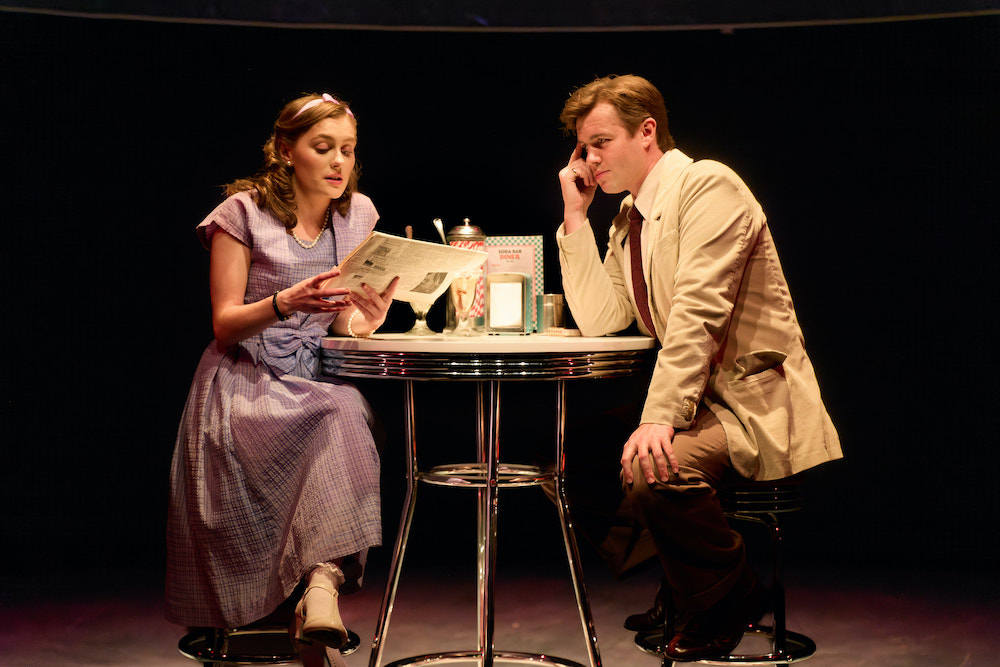British theatre has a proud heritage of science plays. From 1990s classics such as Tom Stoppard’s Arcadia (1993) and Michael Frayn’s Copenhagen (1998) to more recent examples such as Lucy Kirkwood’s Mosquitoes (2017) and Marek Horn’s Octopolis (2023), the trick lies in balancing intellectual material about often complex scientific subjects with dramatic flair.
As the Hampstead Theatre stages Stella Feehily’s new play, The Lightest Element, which was originally commissioned by the Manhattan Theatre Club, the question of how to entertain as well as inform gets a contemporary twist as the playwright explores the themes of sexism and politics, as well as scientific discovery. The setting is historical, but the subject is as relevant as ever.
Feehily’s play beings in 1925 when Cecilia Payne – a 25-year-old British PhD student now living in American because she’s not allowed to graduate in Cambridge due to institutional sexism – summits a thesis in which she argues that stars are composed of hydrogen and helium. Her Harvard professor, Henry Norris Russell, disagrees with this innovative theory and makes her change her work. Despite this setback, Payne pursues a career as an astrophysicist, marries Sergei Gaposchkin, a Russian exile, has three kids, and as Payne-Gaposchkin is, in 1956, in line for the prestigious job of Chair of Astronomy – the first woman to chair a department at Harvard.
But things do not go smoothly. Although Harvard is more enlightened than Cambridge, the male scientists there are similarly sceptical of female colleagues. So Payne-Gaposchkin faces considerable opposition to her promotion. The scenes in which she, along with her assistant Rona Stewart, discuss and then confront the sexism of the male professors are suitably pertinent, even if her success feels a bit predictable. At the same time, the legacy of McCarthyism means that, because of her husband’s original nationality and their activities during the war (when the Soviet Union was after all a glorious ally), she is suspected of being a Communist.
It has to be said that Feehily’s subject, which she calls “the most famous Buckinghamshire woman who most people have never heard of”, is fascinating. I had no idea about Payne-Gaposchkin’s achievements in astrophysics and I love the fact that now I’ve been enlightened. On the other hand, although The Lightest Element is a neat 95-minute show, I do feel that it only presents some fragments of the Payne-Gaposchkin story. Now that the playwright has told me something, I want to know more: this play, compelling as it is, seems to me like a taster – surely, there’s a full-length play to be written about this subject.
For example, Feehily more than once mentions the discussions that the Payne-Gaposchkins hosted during the war: it would have be fascinating to know more about these. As it is, the most dramatic conflict in this version is the fictional one between Sally and Norman, and even this relationship – with its depiction of the power relations between men and women in 1950s America – could have been expanded. Surely there is also more to say about how anti-Communism played out in Harvard in those years, and more to say about the uneasy links between sciences and politics.
As it is, The Lightest Element is sleek in its plotting and gives us plenty of examples of masculine myopia and hysteria. In a central scene, the Harvard professors invent a ludicrous variety of reasons, from the intellectual to the biological, why a woman should not have the same status as a man. This, along with Payne-Gaposchkin’s own more stoic account of her career, is still relevant. You’d love to be able to say that these attitudes don’t exist any more – except that they do. Likewise, politics, and especially anti-progressive attitudes, are still alive and well in prestigious institutions. So a lot of the writing retains a resonance even if it is occasionally marred by anachronisms.
Alice Hamilton’s coolly paced production can’t quite tease all of the drama out of a story whose ending – “Don’t let anyone shut you up. Make some noise, ladies!” – has a powerful sense of inspiration. This important scene is a lecture – a form which in the theatre feels a bit static. Still, Sarah Beaton’s set has a curved video screen above the stage, where video designer Zakk Hein can project attractive images of the sky, stars, and mathematical equations. At the centre of the action, which moves back and forth across the decades, Maureen Beattie gives a serious, subtle and detailed reading of Payne-Gaposchkin’s personality, and her performance is always fascinating to watch. In the subplot, Annie Kingsnorth and Steffan Cennydd (pictured above) play Sally and Norman, while Rina Mahoney (Rona), plus Simon Chandler and Julian Wadham as two of several professors give good support. But while Feehily succeeds in conveying her enthusiasm for her central character, and some of the excitement and wonder of scientific discovery, the play is a rather slender affair.














Add comment